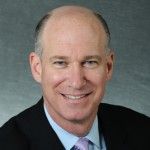It is no secret that we are experiencing enormous change in health care in the United States. At GW’s School of Medicine and Health Sciences (SMHS), we see this transition as an opportunity to lead. It is our responsibility to provide the highest-quality education and training for our students, residents, fellows, and faculty, so they can embrace the health care environment of the future as leaders in their fields.

As our Class of 2014 graduates and its members enter an industry that no longer reflects the health care system of years past, we know that they will be able to skillfully and confidently attend to the needs of their patients in this changing environment. Because of their hard work and dedication to helping others, we will celebrate their accomplishments during graduation ceremonies in May.
From an institutional standpoint, we’re evolving to meet the changes in the marketplace. We continue to upgrade and expand our physical space, providing our faculty members with the tools and environment to advance knowledge. We are crafting a strategic plan that will serve as a road map to continued successes in education, research, clinical care, and community service. We have made significant additions to the school’s leadership team, including the appointments of a new senior associate research dean and a senior associate dean for clinical public health. Additionally, we have appointed new chairs in the departments of psychiatry and behavioral sciences, and obstetrics and gynecology. These new leaders serve as a strong foundation for our school, our programs, and our students, and they will help guide our institution as we navigate the shift occurring across health care.
Naturally, in an atmosphere of change, we are also implementing innovative approaches to education. For our incoming M.D. students, we will present a revised curriculum with an emphasis on active learning, earlier clinical experience, enhanced professional development, and independent study time, and will integrate material to enhance learning and retention.
As medicine and health care increasingly shift to an interdisciplinary, team-based model, we have emphasized team-based learning across our programs, promoting side-by-side learning experiences with colleagues in various specialties. In our newly expanded Clinical Learning and Simulation Skills Center, we are able to re-create real-life scenarios in a safe environment, allowing students to learn the most effective methods for communication between health professionals while providing treatment.
Additionally, we are adding new educational opportunities within the health sciences — meeting the demands of our students and the health care community alike — such as developing a new integrative medicine program, expanding opportunities at GW’s Virginia Science and Technology Campus, and setting plans in motion for an occupational therapy program.
As an academic medical center, we have a responsibility to be a leader in medical education and research. As the health care market changes, we will continue to train students, residents, and fellows to be a part of a diverse and highly skilled workforce equipped to care for patients within our local, national, and global communities. As I often say, it’s an exciting time at GW SMHS — but it’s also an exciting time across the health care spectrum. I invite you to take the opportunity to get involved with our institution, as we lead during this time of great change and progress. Sincerely,

Jeffrey S. Akman, M.D. ’81, RESD ’85
Walter A. Bloedorn Professor of Administrative Medicine Vice President for Health Affairs and Dean, School of Medicine And Health Sciences



